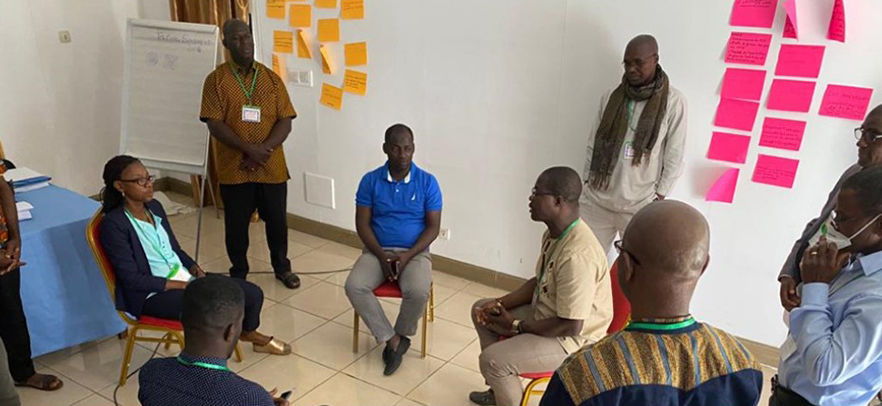Strengthening Infection Prevention and Control in Côte d’Ivoire
Hygiene in health facilities plays a critical role for quality care and preventing transmission of diseases. Despite a number of significant achievements in past years in Côte d’Ivoire, an analysis of 30 health facilities in 2018 with the WHO’s Infection Prevention and Control Assessment Framework identified a number of insufficiencies related to hygiene practices. These deficiencies contribute to health care-acquired infections and antimicrobial resistance (AMR). For example, resistance to amoxicillin (a penicillin antibiotic that fights bacteria) averaged between 73.7% and 87.3% between 2012 and 2017.
Based on these results, building capacity for health workers became an urgent priority.
“Problems occur because health workers do not have the required knowledge in regards to infection prevention and control (IPC) to protect patients and themselves against infections,” says Dr. Blaise Acho, Deputy Director for Hospital Hygiene at the Ministry of Health and Public Hygiene.
On March 23-28, 2020, the Direction générale de la Santé, the Direction de la Médecine hospitalière et de Proximité, the Direction de l’Hygiène publique et de la Santé-environnement, and the Institut National d’Hygiène Publique, in collaboration with USAID MTaPS and WHO, organized a training workshop for IPC trainers. A total of 21 IPC experts (15 men and 6 women) from the Ministries of Health and Public Hygiene, Higher Education and Scientific Research, and Environment and Sustainable Development participated in the workshop. The objectives of the workshop were to create a pool of national trainers using an IPC curriculum and training material to combat AMR and to assess and prevent health care-acquired infections.

Participants discussing preventive measures and the risks and consequences of poor management of health waste. (Photo credit: Dr. Ange-Fulgence Ouffoue/MTaPS)
MTaPS provided both financial and technical support for the workshop and for developing training documents (the training guide and student manual). WHO leveraged the workshop as an opportunity to train student-trainers to respond to the COVID-19 pandemic and provide guidance in key areas, such as risk communications, surveillance, and specific IPC measures related to COVID-19.
Through MTaPS’ facilitated process at the workshop, the participants used the first national curriculum in hygiene and IPC for human health. It also helped student trainers enhance their skills and created a pool of national trainers who will be able to train other health professionals. The curriculum will be used as the main tool for training experts on IPC for the COVID-19 pandemic.
“The organization of this workshop was a necessity, considering the current emergency due to COVID-19 but also because it helped put a system in place that fosters quality training in health facilities to contain multidrug-resistant bacteria,” indicated Dr. Ange-Fulgence Ouffoue, Senior Technical Advisor for MTaPS.
The trained workers will be in charge of conducting further trainings for COVID-19 at their facilities.
Dr. Kouadio-Ngbesso Nadege, one of the participants, said, “The training of trainers was very useful. My gaps in IPC knowledge were filled thanks to the sessions that were provided, as well as exchanges with other participants. With this training, I will be able to train other professionals on IPC.”
The trained participants will be able to provide their knowledge to 468 other health care providers and 190 cleaning professionals and waste management staff from 17 regional hospitals and 2 university hospital centers, building the country’s capacity to both combat COVID-19 efficiently and benefit them in the long term.